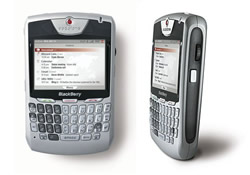Der kanadische Handyhersteller Blackberry befindet sich rund zwei Jahren in einer Schieflage und könnte nun von dem Finanzdienstleister Fairfax Financial für 4,7 Milliarden US-Dollar übernommen werden. Der Aufsichtsrat gab bereits grünes Licht und nun müssen bis zum 4.November 2013 die Aktionäre der Übernahme ebenfalls zustimmen.
[Weiterlesen…] Infos zum Plugin Blackberry wird verkauft
BlackBerry
Preiswertes Tablet – RIM Blackberry Playbook
Das Tablet Blackberry Playbook des kanadischen Handyherstellers Research in Motion (RIM) kann derzeit zu Schnäppchenpreisen erworben werden. Im Handel es ist mit 16, 32 und 64 Gigabyte Speicherkapazität erhältlich. Das Topmodell mit 64 Gigabyte internen Speicher kostet je nach Händler etwa 180 bis 250 Euro. Auf der technischen Seite wurde es mit einem 7 Zoll großen Touchscreen, 1 GB RAM Arbeitsspeicher, WLAN und einem 1 Gigahertz schnellen Dualcore-Prozessor ausgestattet.
[Weiterlesen…] Infos zum Plugin Preiswertes Tablet – RIM Blackberry Playbook
Neues Smartphone Blackberry Torch 9860
Das kanadische Handyhersteller RIM hat mit dem Blackberry Torch 9860 ein neues Smartphone mit Touchscreen vorgestellt. Es wurde mit einem 3,7 Zoll großen Touchscreen, einem 1,2 Gigahertz schnellen Prozessor, Digitalkamera, 768 Megabyte RAM Arbeitsspeicher, vier Gigabyte internen Speicher, UMTS, GPRS, EDGE, GSM, WLAN, Bluetooth, GPS und einem Digitalkompass ausgestattet. Die Auflösung des Touchscreens wurde auf 800*480 Pixel festgelegt bei einer Darstellung von bis zu 16 Millionen Farben. Die Bedienung erfolgt über das Touchdisplay, Trackpad und zwei Blackberry-Knöpfen.
[Weiterlesen…] Infos zum Plugin Neues Smartphone Blackberry Torch 9860
Adding a TCP/IP stack to the BlackBerry 8707v
My first BlackBerry was a 7100v, the first that had the slim form factor and two letters per key – which despite what anyone says, is still more uncomfortable than a full-sized thumb pad. After a couple of years, I have returned to the BlackBerry (but still keep a Nokia N93 handy for pictures & video), getting an 8708v from Vodafone. Main features are a slower non-Intel processor, but CDMA 3G/UMTS technology, which makes surfing and downloading attachments much faster than over GPRS.

After a couple of days of trying to load my favorite software on it, I realized that the 8707v has a very big, very upsetting flaw for anyone who wants to use it beyond email, scheduling and phone duty. It doesn’t have a TCP/IP stack, like other BlackBerries – so connectivity has to be through BES/MDS or BIS, leaving out many applications which need a direct socket connection, for example, the very excellent jmIrc, which kept on saying “could not open tunnel” when trying to get connected. Checking out BlackBerryForums, and Jan-Piet Mens’ blog, the truth started to sink in – RIM had deliberately left out the IP stack, citing unknown problems as the reason. The official statement is here.
Some applications worked, such as Idokorro’s rather good SSH client, and IM+, configured to use a BIS connection. Performance was very poor though, taking a very long time to establish any connection.
Yesterday, I remembered using Opera on the 7100v and being a nice browser than the built-in one, so I set off to download and install it. Not exactly sure how it used to be installed in the days of the 7100v, but this time, when launching Opera, it attempted to run through a series of “tests”, eleven in total, trying to determine how to get connected to the net…and they all failed. A few minutes later on BlackBerryForums, this little gem showed up – explaining the method to configure an APN for the mobile operator in question in order to allow TCP connections – but surely it had to be wrong, the article refered to the 8707v. Well it turned out to be correct, and now, I have a TCP section in Advanced Options, where I can enter an APN, user name and password. I went ahead and tried Vodafone’s APN for Spain, airtelnet.es (Vodafone’s entry into Spain was through the purchase of Airtel, and it seems some things always stay the same!), and it worked! jmIrc also succeeded in connecting to the Freenode IRC server, as all other applications that weren’t working did.
What did installing Opera Mini do? Add a service book? Unlock the dormant stack, or install it? If anyone has an explanation, please do let me know – and to those who were undecided about the 8707v due to the lack of IP connectivity, this seems to be a solution.